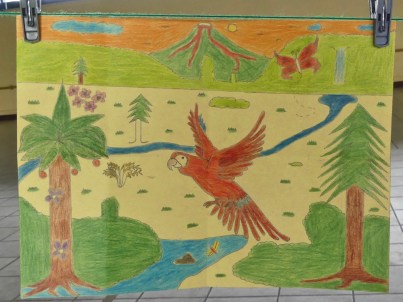I’ve had the privilege over the last two years of being directly involved with the Cornell Lab of Ornithology’s Birdsleuth International program, or Detectives de Aves in Spanish, here in Coto Brus, Costa Rica. During this time I’ve worked with three different instructors, and have interacted with around 200 kids in more than 15 different schools. I would like to briefly share with you what I think are some of the most important opportunities this program offers students.
Detectives de Aves encourages students to establish a personal relationship with birds, by whatever means works best for them. Kids here receive a pretty clear message in school that it is good and important to protect the environment and wild animals, which is great, but I think that for many of them this is a pretty abstract message that they repeat because they know that that’s what their teachers, and other adults, want to hear. I think this sounds familiar to many of us.
Unlike more traditional classes, Detectives de Aves encourages students to express and explore what they really think and believe about birds and the environment. We always ask the kids why they think what they do, and to try and push beyond the polite, expected answer. We encourage them to develop a deeper and more nuanced understanding of the complex and highly interdependent nature of ecosystems, of which they are a part.
However, kids bring lots of different strengths and passions to the classroom, and Detectives tries to involve as many as it can. Not all students respond strongly to abstract reasoning. Some hear the word “Science” and think immediately about football. Some kids’ brains just seem to turn off when another list is written on the whiteboard, or a scientific name like Ramphastos ambiguus is thrown around by another student. We want to make birds and science relevant and personal to as many kids as we can, even those who aren’t really interested directly in birds and science. We try to do this in many ways, but I would like to share two brief examples of how I think we succeeded.
Art Show: Last year with instructor Eugenio García we decided to have an art show in San Vito for all of the students participating in the program. The student who won has a very interesting story. He came from a rural school called San Gabriel. He was always very quiet and hung out at the back of the group when we went for outdoor activities, and almost never spoke in the classroom. I tried talking to him a few times, without much success, and I wasn’t sure if he was really interested in the course or not. When Eugenio returned home at about 8 PM on the day the pictures were due for the show, he heard a voice call his name from across the street. He turned and saw this kid huddled under a tree trying to keep dry. He had walked about 2 kilometers down the very steep mountain in the dark and pouring rain to turn in his picture. That’s passion! But what really caught my eye at the art show was that he didn’t just draw a bird, but gave us a whole little ecosystem, with trees, insects, flowers, a river, and a volcano. Something had obviously clicked for him in the course. Here’s his drawing. You can see all the other drawings here. 
Science Fair: This year at the Barrio Canadá school we did a pilot program in their computer lab to use the web site ebird.org to teach the students how to find quality information for themselves online. One of the students took it on himself to put together all of the work he had done during the computer labs and turn it into to an entry for the school Science Fair, which he won. This student wasn’t really all that interested in birds during the classroom sessions, but he obviously really liked computers and was always racing ahead in the exercises. What really excited him were the interactive maps on eBird that show how birds migrate. So, he ended up learning a lot about birds while doing what he loved to do.
Detectives de Aves is designed to encourage kids to participate more fully in their own learning and to ask questions. It pretty much begs the instructors to come up with new ideas for getting their students involved and passionate, and we have instructors that are in the classroom to do precisely that. There are many ways to teach about birds and the environment, but I’m not sure it’s possible to teach anyone to really care – to invest a part of themselves and their identities in the natural world. Detectives gives kids many opportunities to learn to care, using whatever talents and passions they bring with them.
Peter Wendell, Vice President, San Vito Bird Club

You must be logged in to post a comment.